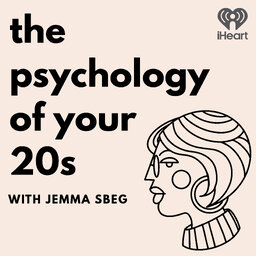183. Disliking your friends partner
You're not going to get along with everyone and one of those people you don't get along with might end up dating someone you love i.e your friend. Disliking your friends partner often stems from one of three reasons: your dating preferences don't match, you're experiencing platonic jealousy, you're genuinely worried about this other person being bad for your friend, exploitative or abusive. We talk about all three of these outcomes in today's episode along with what to do in response: do you stay silent or speak up?
Listen now!
Follow Jemma on Instagram: @jemmasbeg
Follow the podcast on Instagram: @thatpsychologypodcast
In 1 playlist(s)
The Psychology of your 20s
A podcast that explains how everything is psychology. Even your 20s. Each Tuesday and Friday we deep…Social links
Follow podcast
Recent clips

391. The unconscious vs. conscious mind
42:55

390. The psychology of serial monogamy & relationship hopping
30:10

389. How to experience healthy love after toxic love
55:30
 The Psychology of your 20s
The Psychology of your 20s